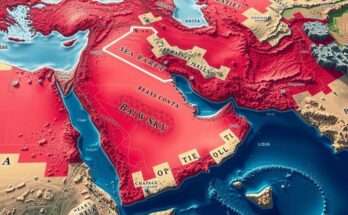Tensions escalated in the Horn of Africa as Somalia demands Ethiopia annul a controversial port deal with Somaliland, which has sparked a military alliance between Somalia and Egypt. Ethiopia’s aspirations for a maritime route exacerbate regional conflicts, as it faces growing diplomatic isolation and military threats amid a complex web of alliances.
Tensions in the Horn of Africa are escalating as Somalia presses Ethiopia to rescind its contentious port agreement with Somaliland, a self-declared republic that has sought independence from Somalia. Somalia has demanded that Ethiopia withdraw its troops from Somali territory as a condition for ceasing its opposition to the deal. A pivotal development signaling Somalia’s discontent was the signing of a military alliance with Egypt on August 14, further intensifying the regional dynamics. Egypt, Ethiopia’s long-standing rival, has since supplied Somalia with military equipment and is rumored to be contemplating the deployment of up to 10,000 troops to assist in the fight against the al-Shabab militant group. Ethiopia, feeling the diplomatic strain, has responded to the strengthening ties between Somalia and Egypt with defensive rhetoric. Prime Minister Abiy Ahmed issued a stark warning to potential aggressors, emphasizing Ethiopia’s commitment to self-defense, while Chief of Staff General Birhanu Jula invoked memories of the past conflict with Somalia. At the heart of the current discord lies Abiy’s aspiration for Ethiopia to secure a route to the sea, which he perceives as a critical national interest. In January, Ethiopia formally entered into a memorandum of understanding (MoU) with Somaliland, involving a lease for coastal territory that would facilitate the construction of a naval base. This agreement was met with vehement opposition from Somalia, which has a historical claim over Somaliland and has threatened military action despite lacking access to the complete terms of the MoU. Somalia’s diplomatic efforts have further isolated Ethiopia by garnering support from multiple regional and international actors, including Turkey, Eritrea, Djibouti, the United States, the European Union, and the Arab League. Ethiopia maintains a substantial military presence in Somalia as part of the African Union mission against al-Shabab. However, the future of its troops is now precarious, dependent on the resolution of the MoU controversy. Moreover, the intricate dynamics surrounding the Grand Ethiopian Renaissance Dam (GERD) dispute with Egypt further complicate the situation, as Cairo appears to exploit regional discontent to apply pressure on Addis Ababa.
The Horn of Africa has long been a region characterized by complex geopolitical relations, particularly between Ethiopia, Somalia, and Egypt. Ethiopia’s landlocked status has historically hindered its access to maritime trade routes, creating a pressing need for a sea outlet. This drive has led to Ethiopia entering agreements with neighboring Somaliland, a territory that has proclaimed independence from Somalia, further inciting tensions with the Somali government. The underlying factors include unresolved territorial claims, historical grievances, and ongoing conflicts with insurgent groups such as al-Shabab. The situation is further exacerbated by external influences and shifting alliances, particularly within the context of the broader strategic interests of Egypt regarding the Nile River.
The rising tensions in the Horn of Africa stem from Ethiopia’s controversial port agreement with Somaliland and Somalia’s urgent calls for its annulment. The fractured dynamics illustrate a regional struggle over historical rivalries and the pursuit of maritime access, particularly as Ethiopia seeks to assert its sovereignty amidst international pressures. The interplay of alliances and military posturing, spearheaded by Egypt’s backing of Somalia, raises significant concerns over stability in the region as both countries navigate this precarious diplomatic landscape.
Original Source: www.thenewhumanitarian.org




